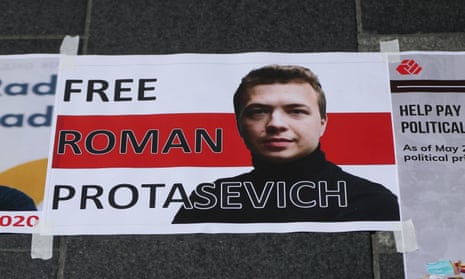The role of UK companies in allegedly helping to prop up Europe’s so-called “last dictatorship” is coming under unprecedented pressure amid signs that lobbying by Belarusian exiles and others is paying off.
Rolls-Royce and British American Tobacco are among the firms that have responded to lobbying by the Belarusian diaspora and indicated they were willing to take action.
In the wake of the “hijacking” last Sunday of a Ryanair plane and the arrest of two passengers onboard, the Belarusian journalist Raman Pratasevich and his Russian girlfriend, activists in the UK have stepped up lobbying of the holders of Belarus bonds listed on the London Stock Exchange (LSE).
But among the UK-based companies to have responded are some which have been alerted to alleged severe violations of workers’ rights to assemble, strike and form independent trade unions at Belarusian state-owned enterprises.
They include Rolls-Royce, which is a supplier of BelAZ, a Belarusian vehicle factory and one of the world’s largest manufacturers of large dump trucks. Rolls-Royce confirmed to the Guardian that it was investigating concerns raised about the relationship between its Power Systems business, based in Germany, and BelAZ.
“Depending on the outcome, we may choose to take action in relation to our existing and any future business relationship,” the company said. “We are guided by our values when considering such matters and, of course, we comply in full with any applicable sanctions.”
Protests have continued outside the offices of British American Tobacco over its connections with the state-owned Grodno Tobacco Factory (GTF) Neman. The largest cigarette factory in Belarus makes cigarettes under licence for BAT.
“Britain is a window to the world. It is a high financial centre. It has an important role in trade despite Brexit. So we are stepping up our campaign,” said a spokesperson for the Professional Union of Belarusians in Britain. “BAT has been an important example, but we have also, for example, become aware of indications that some British companies are actually buying wood from Belarus and the figures there have been quite significant. We are going to investigate that as well.
“In terms of British business, their attitude so far has been pretty much along the lines of ‘as long as we can make money we do’. Many big companies have codes of conduct with pleasant-sounding wording, but there are questions about how they are employed in practice when it comes to Belarus.”
A BAT spokesperson said the company was committed to complying with all the applicable local and international legislative requirements as well as its own standards.
“In line with our commitment to respect human rights, this year we will undertake additional actions: BAT Belarus will be subject to an enhanced human rights due-diligence process; and the GTF Neman factory, as a supplier to the BAT Group, will be subject to an onsite workplace conditions assessment by our third-party audit provider.”
Dominic Raab, the foreign secretary, was urged by his Labour shadow, Lisa Nandy, to impose sanctions against state-owned enterprises in Belarus – some of which continue to have UK subsidiaries, such as BNK (UK).
Raab has castigated what he described as a “reckless, cynical and dangerous hijacking of the Ryanair flight by the Belarus government” and said further sanctions were being considered against Belarus. The operating permit for Belavia, the country’s state-owned airline, has been suspended in the UK.
In June 2020 the Belarus finance ministry issued two sovereign eurobonds on the London Stock Exchange for a total of $1.25bn (£880m). In a posting on the LSE’s website, Ayuna Nechaeva, the LSE’s head of Europe, described the listing as “testament to the high level of investor demand in the Belarusian story”. The LSE declined to comment when approached by the Guardian.
